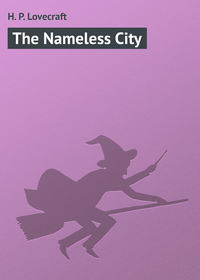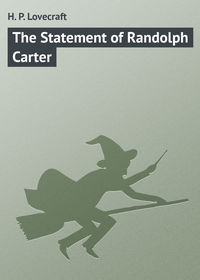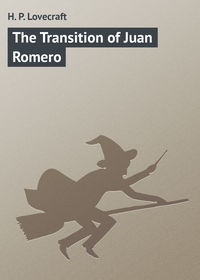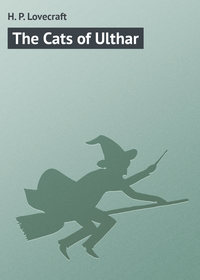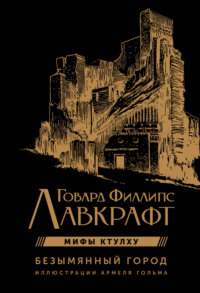
Полная версия
Dagon and Other Macabre Tales
The months following my discovery were spent in futile attempts to force the complicated padlock of the slightly open vault, and in carefully guarded inquiries regarding the nature and history of the structure. With the traditionally receptive ears of the small boy, I learned much; though an habitual secretiveness caused me to tell no one of my information or my resolve. It is perhaps worth mentioning that I was not at all surprised or terrified on learning of the nature of the vault. My rather original ideas regarding life and death had caused me to associate the cold clay with the breathing body in a vague fashion; and I felt that the great and sinister family of the burned-down mansion was in some way represented within the stone space I sought to explore. Mumbled tales of the weird rites and godless revels of bygone years in the ancient hall gave to me a new and potent interest in the tomb, before whose door I would sit for hours at a time each day. Once I thrust a candle within the nearly closed entrance, but could see nothing save a flight of damp stone steps leading downward. The odor of the place repelled yet bewitched me. I felt I had known it before, in a past remote beyond all recollection; beyond even my tenancy of the body I now possess.
The year after I first beheld the tomb, I stumbled upon a worm-eaten translation of Plutarch’s Lives in the book-filled attic of my home. Reading the life of Theseus, I was much impressed by that passage telling of the great stone beneath which the boyish hero was to find his tokens of destiny whenever he should become old enough to lift its enormous weight. The legend had the effect of dispelling my keenest impatience to enter the vault, for it made me feel that the time was not yet ripe. Later, I told myself, I should grow to a strength and ingenuity which might enable me to unfasten the heavily chained door with ease; but until then I would do better by conforming to what seemed the will of Fate.
Accordingly my watches by the dank portal became less persistent, and much of my time was spent in other though equally strange pursuits. I would sometimes rise very quietly in the night, stealing out to walk in those churchyards and places of burial from which I had been kept by my parents. What I did there I may not say, for I am not now sure of the reality of certain things; but I know that on the day after such a nocturnal ramble I would often astonish those about me with my knowledge of topics almost forgotten for many generations. It was after a night like this that I shocked the community with a queer conceit about the burial of the rich and celebrated Squire Brewster, a maker of local history who was interred in 1711, and whose slate headstone, bearing a graven skull and crossbones, was slowly crumbling to powder. In a moment of childish imagination I vowed not only that the undertaker, Goodman Simpson, had stolen the silver-buckled shoes, silken hose, and satin small-clothes of the deceased before burial; but that the Squire himself, not fully inanimate, had turned twice in his mound-covered coffin on the day after interment.
But the idea of entering the tomb never left my thoughts; being indeed stimulated by the unexpected genealogical discovery that my own maternal ancestry possessed at least a slight link with the supposedly extinct family of the Hydes. Last of my paternal race, I was likewise the last of this older and more mysterious line. I began to feel that the tomb was mine, and to look forward with hot eagerness to the time when I might pass within that stone door and down those slimy stone steps in the dark. I now formed the habit of listening very intently at the slightly open portal, choosing my favorite hours of midnight stillness for the odd vigil. By the time I came of age, I had made a small clearing in the thicket before the mold-stained façade of the hillside, allowing the surrounding vegetation to encircle and overhang the space like the walls and roof of a sylvan bower. This bower was my temple, the fastened door my shrine, and here I would lie outstretched on the mossy ground, thinking strange thoughts and dreaming strange dreams.
The night of the first revelation was a sultry one. I must have fallen asleep from fatigue, for it was with a distinct sense of awakening that I heard the voices. Of these tones and accents I hesitate to speak; of their quality I will not speak; but I may say that they presented certain uncanny differences in vocabulary, pronunciation, and mode of utterance. Every shade of New England dialect, from the uncouth syllables of the Puritan colonists to the precise rhetoric of fifty years ago, seemed represented in that shadowy colloquy, though it was only later that I noticed the fact. At the time, indeed, my attention was distracted from this matter by another phenomenon; a phenomenon so fleeting that I could not take oath upon its reality. I barely fancied that as I awoke, a light had been hurriedly extinguished within the sunken sepulcher. I do not think I was either astounded or panic-stricken, but I know that I was greatly and permanently changed that night. Upon returning home I went with much directness to a rotting chest in the attic, wherein I found the key which next day unlocked with ease the barrier I had so long stormed in vain.
It was in the soft glow of late afternoon that I first entered the vault on the abandoned slope. A spell was upon me, and my heart leaped with an exultation I can but ill describe. As I closed the door behind me and descended the dripping steps by the light of my lone candle, I seemed to know the way; and though the candle sputtered with the stifling reek of the place, I felt singularly at home in the musty, charnel-house air. Looking about me, I beheld many marble slabs bearing coffins, or the remains of coffins. Some of these were sealed and intact, but others had nearly vanished, leaving the silver handles and plates isolated amidst certain curious heaps of whitish dust. Upon one plate I read the name of Sir Geoffrey Hyde, who had come from Sussex in 1640 and died here a few years later. In a conspicuous alcove was one fairly well preserved and untenanted casket, adorned with a single name which brought me both a smile and a shudder. An odd impulse caused me to climb upon the broad slab, extinguish my candle, and lie down within the vacant box.
In the gray light of dawn I staggered from the vault and locked the chain of the door behind me. I was no longer a young man, though but twenty-one winters had chilled my bodily frame. Early-rising villagers who observed my homeward progress looked at me strangely, and marveled at the signs of ribald revelry which they saw in one whose life was known to be sober and solitary. I did not appear before my parents till after a long and refreshing sleep.
Henceforward I haunted the tomb each night; seeing, hearing, and doing things I must never recall. My speech, always susceptible to environmental influences, was the first thing to succumb to the change; and my suddenly acquired archaism of diction was soon remarked upon. Later a queer boldness and recklessness came into my demeanor, till I unconsciously grew to possess the bearing of a man of the world despite my lifelong seclusion. My formerly silent tongue waxed voluble with the easy grace of a Chesterfield or the godless cynicism of a Rochester. I displayed a peculiar erudition utterly unlike the fantastic, monkish lore over which I had pored in youth; and covered the fly-leaves of my books with facile impromptu epigrams which brought up suggestions of Gay, Prior, and the sprightliest of the Augustan wits and rimesters. One morning at breakfast I came close to disaster by declaiming in palpably liquorish accents an effusion of Eighteenth Century bacchanalian mirth, a bit of Georgian playfulness never recorded in a book, which ran something like this:
Come hither, my lads, with your tankards of ale,
And drink to the present before it shall fail;
Pile each on your platter a mountain of beef,
For ‘tis eating and drinking that bring us relief:
So fill up your glass,
For life will soon pass;
When you’re dead ye’ll ne’er drink to your king or your lass!
Anacreon had a red nose, so they say;
But what’s a red nose if ye’re happy and gay?
Gad split me! I’d rather be red whilst I’m here,
Than white as a lily – and dead half a year!
So Betty, my miss,
Come give me kiss;
In hell there’s no innkeeper’s daughter like this!
Young Harry, propp’d up just as straight as he’s able,
Will soon lose his wig and slip under the table,
But fill up your goblets and pass ’em around –
Better under the table than under the ground!
So revel and chaff
As ye thirstily quaff:
Under six feet of dirt ’tis less easy to laugh!
The fiend strike me blue! I’m scarce able to walk,
And damn me if I can stand upright or talk!
Here, landlord, bid Betty to summon a chair;
I’ll try home for a while, for my wife is not there!
So lend me a hand;
I’m not able to stand,
But I’m gay whilst I linger on top of the land!
About this time I conceived my present fear of fire and thunderstorms. Previously indifferent to such things, I had now an unspeakable horror of them; and would retire to the innermost recesses of the house whenever the heavens threatened an electrical display. A favorite haunt of mine during the day was the ruined cellar of the mansion that had burned down, and in fancy I would picture the structure as it had been in its prime. On one occasion I startled a villager by leading him confidently to a shallow sub-cellar, of whose existence I seemed to know in spite of the fact that it had been unseen and forgotten for many generations.
At last came that which I had long feared. My parents, alarmed at the altered manner and appearance of their only son, commenced to exert over my movements a kindly espionage which threatened to result in disaster. I had told no one of my visits to the tomb, having guarded my secret purpose with religious zeal since childhood; but now I was forced to exercise care in threading the mazes of the wooded hollow, that I might throw off a possible pursuer. My key to the vault I kept suspended from a cord about my neck, its presence known only to me. I never carried out of the sepulcher any of the things I came upon whilst within its walls.
One morning as I emerged from the damp tomb and fastened the chain of the portal with none too steady hand, I beheld in an adjacent thicket the dreaded face of a watcher. Surely the end was near; for my bower was discovered, and the objective of my nocturnal journeys revealed. The man did not accost me, so I hastened home in an effort to overhear what he might report to my careworn father. Were my sojourns beyond the chained door about to be proclaimed to the world? Imagine my delighted astonishment on hearing the spy inform my parents in a cautious whisper that I had spent the night in the bower outside the tomb; my sleep-filmed eyes fixed upon the crevice where the padlocked portal stood ajar! By what miracle had the watcher been thus deluded? I was now convinced that a supernatural agency protected me. Made bold by this heaven-sent circumstance, I began to resume perfect openness in going to the vault; confident that no one would witness my entrance. For a week I tasted to the full joys of that charnel conviviality which I must not describe, when the thing happened, and I was borne away to this accursed abode of sorrow and monotony.
I should not have ventured out that night; for the taint of thunder was in the clouds, and a hellish phosphorescence rose from the rank swamp at the bottom of the hollow. The call of the dead, too, was different. Instead of the hillside tomb, it was the charred cellar on the crest of the slope whose presiding demon beckoned to me with unseen fingers. As I emerged from an intervening grove upon the plain before the ruin, I beheld in the misty moonlight a thing I had always vaguely expected. The mansion, gone for a century, once more reared its stately height to the raptured vision; every window ablaze with the spendor of many candles. Up the long drive rolled the coaches of the Boston gentry, whilst on foot came a numerous assemblage of powdered exquisites from the neighboring mansions. With this throng I mingled, though I knew I belonged with the hosts rather than with the guests. Inside the hall were music, laughter, and wine on every hand. Several faces I recognized; though I should have known them better had they been shriveled or eaten away by death and decomposition. Amidst a wild and reckless throng I was the wildest and most abandoned. Gay blasphemy poured in torrents from my lips, and in shocking sallies I heeded no law of God, man, or nature.
Suddenly a peal of thunder, resonant even above the din of the swinish revelry, clave the very roof and laid a hush of fear upon the boisterous company. Red tongues of flame and searing gusts of heat engulfed the house; and the roysterers, struck with terror at the descent of a calamity which seemed to transcend the bounds of unguided nature, fled shrieking into the night. I alone remained, riveted to my seat by a groveling fear which I had never felt before. And then a second horror took possession of my soul. Burnt alive to ashes, my body dispersed by the four winds, I might never lie in the tomb of the Hydes! Was not my coffin prepared for me? Had I not a right to rest till eternity amongst the descendants of Sir Geoffrey Hyde? Aye! I would claim my heritage of death, even though my soul go seeking through the ages for another corporeal tenement to represent it on that vacant slab in the alcove of the vault. Jervas Hyde should never share the sad fate of Palinurus!
As the phantom of the burning house faded, I found myself screaming and struggling madly in the arms of two men, one of whom was the spy who had followed me to the tomb. Rain was pouring down in torrents, and upon the southern horizon were flashes of lightning that had so lately passed over our heads. My father, his face lined with sorrow, stood by as I shouted my demands to be laid within the tomb, frequently admonishing my captors to treat me as gently as they could. A blackened circle on the floor of the ruined cellar told of a violent stroke from the heavens; and from this spot a group of curious villagers with lanterns were prying a small box of antique workmanship, which the thunderbolt had brought to light.
Ceasing my futile and now objectless writhing, I watched the spectators as they viewed the treasure-trove, and was permitted to share in their discoveries. The box, whose fastenings were broken by the stroke which had unearthed it, contained many papers and objects of value, but I had eyes for one thing alone. It was the porcelain miniature of a young man in a smartly curled bag-wig, and bore the initials ‘J.H.’ The face was such that as I gazed, I might well have been studying my mirror.
On the following day I was brought to this room with the barred windows, but I have been kept informed of certain things through an aged and simple-minded servitor, for whom I bore a fondness in infancy, and who, like me, loves the churchyard. What I have dared relate of my experiences within the vault has brought me only pitying smiles. My father, who visits me frequently, declares that at no time did I pass the chained portal, and swears that the rusted padlock had not been touched for fifty years when he examined it. He even says that all the village knew of my journeys to the tomb, and that I was often watched as I slept in the bower outside the grim facade, my half-open eyes fixed on the crevice that leads to the interior. Against these assertions I have no tangible proof to offer, since my key to the padlock was lost in the struggle on that night of horrors. The strange things of the past which I have learned during those nocturnal meetings with the dead he dismisses as the fruits of my lifelong and omnivorous browsing amongst the ancient volumes of the family library. Had it not been for my old servant Hiram, I should have by this time become quite convinced of my madness.
But Hiram, loyal to the last, has held faith in me, and has done that which impels me to make public at least part of my story. A week ago he burst open the lock which chains the door of the tomb perpetually ajar, and descended with a lantern into the murky depths. On a slab in an alcove he found an old but empty coffin whose tarnished plate bears the single word: Jervas. In that coffin and in that vault they have promised me I shall be buried.
Polaris
Into the North Window of my chamber glows the Pole Star with uncanny light. All through the long hellish hours of blackness it shines there. And in the autumn of the year, when the winds from the north curse and whine, and the red-leaved trees of the swamp mutter things to one another in the small hours of the morning under the horned waning moon, I sit by the casement and watch that star. Down from the heights reels the glittering Cassiopeia as the hours wear on, while Charles’ Wain lumbers up from behind the vapour-soaked swamp trees that sway in the night wind. Just before dawn Arcturus winks ruddily from above the cemetery on the low hillock, and Coma Berenices shimmers weirdly afar off in the mysterious east; but still the Pole Star leers down from the same place in the black vault, winking hideously like an insane watching eye which strives to convey some strange message, yet recalls nothing save that it once had a message to convey. Sometimes, when it is cloudy, I can sleep.
Well do I remember the night of the great Aurora, when over the swamp played the shocking coruscations of the daemon light. After the beam came clouds, and then I slept.
And it was under a horned waning moon that I saw the city for the first time. Still and somnolent did it lie, on a strange plateau in a hollow betwixt strange peaks. Of ghastly marble were its walls and its towers, its columns, domes, and pavements. In the marble streets were marble pillars, the upper parts of which were carven into the images of grave bearded men. The air was warm and stirred not. And overhead, scarce ten degrees from the zenith, glowed that watching Pole Star. Long did I gaze on the city, but the day came not. When the red Aldebaran, which blinked low in the sky but never set, had crawled a quarter of the way around the horizon, I saw light and motion in the houses and the streets. Forms strangely robed, but at once noble and familiar, walked abroad and under the horned waning moon men talked wisdom in a tongue which I understood, though it was unlike any language I had ever known. And when the red Aldebaran had crawled more than half-way around the horizon, there were again darkness and silence.
When I awaked, I was not as I had been. Upon my memory was graven the vision of the city, and within my soul had arisen another and vaguer recollection, of whose nature I was not then certain. Thereafter, on the cloudy nights when I could sleep, I saw the city often; sometimes under the hot, yellow rays of a sun which did not set, but which wheeled low around the horizon. And on the clear nights the Pole Star leered as never before.
Gradually I came to wonder what might be my place in that city on the strange plateau betwixt strange peaks. At first content to view the scene as an all-observant uncorporeal presence, I now desired to define my relation to it, and to speak my mind amongst the grave men who conversed each day in the public squares. I said to myself, ‘This is no dream, for by what means can I prove the greater reality of that other life in the house of stone and brick south of the sinister swamp and the cemetery on the low hillock, where the Pole Star peeps into my north window each night?’
One night as I listened to the discourse in the large square containing many statues, I felt a change; and perceived that I had at last a bodily form. Nor was I a stranger in the streets of Olathoe, which lies on the plateau of Sarkia, betwixt the peaks Noton and Kadiphonek. It was my friend Alos who spoke, and his speech was one that pleased my soul, for it was the speech of a true man and patriot. That night had the news come of Daikos’ fall, and of the advance of the Inutos; squat, hellish yellow fiends who five years ago had appeared out of the unknown west to ravage the confines of our kingdom, and to besiege many of our towns. Having taken the fortified places at the foot of the mountains, their way now lay open to the plateau, unless every citizen could resist with the strength of ten men. For the squat creatures were mighty in the arts of war, and knew not the scruples of honour which held back our tall, grey-eyed men of Lomar from ruthless conquest.
Alos, my friend, was commander of all the forces on the plateau, and in him lay the last hope of our country. On this occasion he spoke of the perils to be faced and exhorted the men of Olathoe, bravest of the Lomarians, to sustain the traditions of their ancestors, who when forced to move southward from Zobna before the advance of the great ice sheet (even as our descendants must some day flee from the land of Lomar) valiantly and victoriously swept aside the hairy, long-armed, cannibal Gnophkehs that stood in their way. To me Alos denied a warrior’s part, for I was feeble and given to strange faintings when subjected to stress and hardships. But my eyes were the keenest in the city, despite the long hours I gave each day to the study of the Pnakotic manuscripts and the wisdom of the Zobnarian Fathers; so my friend, desiring not to doom me to inaction, rewarded me with that duty which was second to nothing in importance. To the watchtower of Thapnen he sent me, there to serve as the eyes of our army. Should the Inutos attempt to gain the citadel by the narrow pass behind the peak Noton and thereby surprise the garrison, I was to give the signal of fire which would warn the waiting soldiers and save the town from immediate disaster.
Alone I mounted the tower, for every man of stout body was needed in the passes below. My brain was sore dazed with excitement and fatigue, for I had not slept in many days; yet was my purpose firm, for I loved my native land of Lomar, and the marble city Olathoe that lies betwixt the peaks of Noton and Kadiphonek.
But as I stood in the tower’s topmost chamber, I beheld the horned waning moon, red and sinister, quivering through the vapours that hovered over the distant valley of Banof. And through an opening in the roof glittered the pale Pole Star, fluttering as if alive, and leering like a fiend and tempter. Methought its spirit whispered evil counsel, soothing me to traitorous somnolence with a damnable rhythmical promise which it repeated over and over:
‘Slumber, watcher, till the spheres,
Six and twenty thousand years
Have revolv’d, and I return
To the spot where now I burn.
Other stars anon shall rise
To the axis of the skies;
Stars that soothe and stars that bless
With a sweet forgetfulness:
Only when my round is o’er
Shall the past disturb thy door.’
Vainly did I struggle with my drowsiness, seeking to connect these strange words with some lore of the skies which I had learnt from the Pnakotic manuscripts. My head, heavy and reeling, drooped to my breast, and when next I looked up it was in a dream, with the Pole Star grinning at me through a window from over the horrible swaying trees of a dream swamp. And I am still dreaming.
In my shame and despair I sometimes scream frantically, begging the dream-creatures around me to waken me ere the Inutos steal up the pass behind the peak Noton and take the citadel by surprise; but these creatures are daemons, for they laugh at me and tell me I am not dreaming. They mock me whilst I sleep, and whilst the squat yellow foe may be creeping silently upon us. I have failed in my duty and betrayed the marble city of Olathoe; I have proven false to Alos, my friend and commander. But still these shadows of my dreams deride me. They say there is no land of Lomar, save in my nocturnal imaginings; that in these realms where the Pole Star shines high, and red Aldebaran crawls low around the horizon, there has been naught save ice and snow for thousands of years, and never a man save squat, yellow creatures, blighted by the cold, whom they call ‘Esquimaux.’


